#the many names of sir gawain
Explore tagged Tumblr posts
Text
Gavin, Lot's lad
#the many names of sir gawain#sir gawain#arthuriana#arthurian mythology#arthurian legends#gwalchmei ap gwyar#king lot
8 notes
·
View notes
Text
Sir Van Halen

“average arthurian knight has 3 names" factoid actualy just statistical error. average knight has 1 name. names gawain, who lives in a castle & has over 10,000 names, is an outlier adn should not have been counted
5K notes
·
View notes
Note
All three! Apologies. I want to learn as much as I can about him.
You got it!
The first text that Galahad appears in is the Vulgate. His predecessors and legacy are first described in The History of the Grail; then he’s conceived, born, and raised during the Lancelot books; finally in Post-Vulgate he’s a knight on Grail Quest where he achieves his life’s purpose and passes away. Additionally, here’s A Companion to The Lancelot-Grail Cycle which may help you navigate the text.
Another book I suggest for your Galahad research is The Legend of the Grail by Nigel Bryant and Norris J. Lacy. It’s got a lengthy introduction about the history of the Grail story and touches on all the characters who’ve achieved it throughout Arthurian literary history including Perceval, Gawain, and of course, Galahad. Each chapter is taken from a different text and newly translated by Nigel Bryant for this publication. It’ll give you an idea of the progression of the Grail story which eventually led to Galahad and introduce you to some adjacent texts that may be of interest.
The next medieval text that includes Galahad is La Tavola Ritonda. It’s mostly a Prose Tristan story, but does cover the whole Grail Quest with a fun Italian Galahad named Galeazzo/Galasso. I enjoy this one a lot! Regarding Galasso specifically, it’s an interesting take on the character—he’s described as very gracious and he wields a cool named sword. Plus his purity grants him necromancy powers—at one point he convenes with the dead and doesn’t bat an eye. Just keeps on adventuring. Focused. In his lane. Pretty neat!
After that comes probably the best known Arthurian text, Le Morte d’Arthur by Sir Thomas Malory. I’ve attached the version of this story abridged by Keith Baines. It’s much easier to read with proper formatting to add quotation marks to dialogue and tighten up the prose. This one also comes with A Companion to Malory which I found exceedingly helpful in breaking down the sometimes convoluted plot threads and character dynamics present in Malory’s story. Many of the essays I’ve attached below relate to this text specifically.
Lastly I would be remiss to exclude The Arthurian Handbook by the goats Norris J. Lacy and Geoffrey Ashe. This volume not only covers medieval texts, but much of the art history that goes hand in hand with Arthurian literature too. There are many paintings, tapestries, stained glass windows, and murals featuring Galahad highlighted in this book. It also includes family trees, heraldry, and maps which can help you conceptualize things detailed in writing throughout the Vulgate.
Now I’m going to list essays without descriptions since there are so many and the titles are pretty self explanatory.
Absent Fathers, Unexpected Sons: Paternity in Malory’s Morte Darthur by Cory Rushton
Born-Again Virgins and Holy Bastards: Bors and Elyne and Lancelot and Galahad by Karen Cherwatuk
Constructing Spiritual Hierarchy through Mass Attendance in the Morte Darthur by David Eugene Clark
Disarming Lancelot by Elizabeth Scala
Galahad, Percival, and Bors: Grail Knights and the Quest for Spiritual Friendship by Richard Sévère
'A Mayde, and Last of Youre Blood': Galahad's Asexuality and its Significance in Le Morte Darthur by Megan Arkenberg
Gender and the Grail by Maureen Fries
Malory and Rape by Catherine Batt
Mothers in the Grail Quest: Desire, Pleasure, and Conception by Peggy McCracken
Seeing Is Believing and Achieving: Viewing the Eucharist in Malory's 'Sankgreal' by Sarah B. Rude
Wounded Masculinity: Injury and Gender in Sir Thomas Malory's "Le Morte Darthur" by Kenneth Hodges
And that about covers it! This should give you plenty to work with. Beyond these, we’re left with literature outside the medieval era, which is a different conversation. No doubt Alfred Lord Tennyson had a huge influence on how Galahad is perceived today, but that’s irrelevant to a discussion regarding medieval source material, and a topic for another time. Hope this helps you out and you learn all you want to about Galahad!
Take care!
#arthuriana#arthurian legend#arthurian mythology#arthurian literature#sir galahad#galahad#resource#ask#anonymous
40 notes
·
View notes
Text
Propaganda:
Prose Lancelot:
- “this is the one where Galehaut gives up fighting Arthur because Lancelot bats his eyelashes at him. He spends a solid chunk of time living in chaste polyamory with Guinevere AND Lancelot. later they get separated and Galehaut dies for love because he thinks Lancelot is dead. Lancelot buries him with his own hands and tries to die by his side.This is Also the one where Gauvain says he wishes he was a woman just so he could bang Lancelot and Guinevere goes "same".”
- “GALEHAUT. Galehaut “had given [Lancelot] his heart with a love greater than loyal companionship alone could make a man feel for someone outside his family”, surrendered to Arthur for Lancelot, stepped over his own broken heart to help him be together with Guinevere, and then died of grief when he thought Lancelot had perished. Also, the remarkable bond of Lancelot and Gawain + Gawain saying he’d turn into a beautiful lady for Lancelot.”
- “Giving up on conquering the enrite kingdom because you want to be besties with Lancelot is pretty gay ngl”
- “Then Sir Gawain thought a little, like a man who believe he would never be well again. “If God were to grant me my health,” he said, “I'd immediately wish to be the most beautiful maiden in the world, happy and healthy, on condition that he would love me above all others, all his life and mine.” (Lancelot-Grail The Old French Arthurian Vulgate and Post-Vulgate in Translation, volume III, General Editor Norris J. Lacy, p.270)”
- “Going for sheer volume & variety here. Galehaut alone is worth the vote but Gawain's "I wish I was a woman so Lancelot would love me" line is just unparalleled. There's also a character named Drian the Gay rescued from a cursed coffin & as we all know, goths are queer on every axis. I rest my case.”
- “many reasons (galehauts whole thing…) but in particular remarkable reasons. that thing gawain says about wishing he was turned into a maiden on the condition that lancelot loves him for his whole life is a lot to me in particular in a multitude of queer ways”
Vulgate Morte:
- “i have a remarkable agenda so the way lancelot and gawain just simply exist, talk and act around each other or when they are not around each other in the vulgate, and the entirety of the morte section so yeah”
- the whole thing with elaine of shalott and lancelot and gawain is so. uhmm

also of course

22 notes
·
View notes
Text
Sonadowtober Prompt 14: Prank
Arthur decides to have a little fun… with consequences unforeseen
Technically Arthurlot and not Sonadow but shush. I’m having fun
Read Below 🔽
Being stuffed in a dress wasn’t exactly a goal of Arthur’s. By his most trusted knight, no less!
It wasn’t unpleasant, per se, but it was definitely unexpected. It was his fault it happened, he had to admit. A war of pranks, with him disguised as a new knight of their table while he pretended to be away for foreign affairs.
Its beginning sat in a joke.
“Gawain,” Arthur— well disguised with a pinch of magic as Sir Dinadan— chirped at the dinner table. “Your eating habits are despicable.”
Everyone goes silent. The Knight of the Sun stared at him, an entire bunch of grapes in his hand. He had the audacity to look surprised. Perhaps his manners were only for show when the king was present. “They are not.”
“Sure,” Arthur shoots, thoroughly amused by his knights’ habits when he was supposedly not around. It wouldn’t hurt to poke fun at them. “For a wolf. Were you perhaps raised by them?”
“Watch your place.” Lancelot! He’d know that voice anywhere. Coming to Gawain’s defense was something of a surprise; the two were well known rivals. Perhaps their bond went deeper than that. “Just because His Majesty isn’t present does not mean you can be brash.”
Arthur hides a smirk at the mention of the king. If only they knew… but this anonymity was too fun to give up so soon. “Gawain can speak for himself.” The echidna glares at him, but doesn’t say a word. “See! He agrees.”
Lancelot stands, slamming his hands on the table. “You’ve got a big mouth for a small guy.” But before he can do anything, Gawain gives him a wave of dismissal.
“Stand down, Lancelot. I don’t need you to defend me.”
And that was that. Or so Arthur thought.
Lancelot fumed at the audacity of this new knight. To insult his comrade! He needed to be taught a lesson.
But how to do such when Gawain refused his help, and brushed it off as if it were alright? He usually held his honor at the highest regard, but perhaps this knave has damaged his ego.
He mulls over his options for a long time, unable to let it go. A brilliant idea suddenly nests itself in his mind when he sees Sir Dinadan’s name on the participants list in the next day’s jousting event.
It was just a fun show, a series of challenges aimed to connect the people. The king himself had proposed it; it was a pity that he wasn’t there to witness its happenings. Lancelot himself would be participating in a swordsmanship contest later, but…
He smiles to himself as he signs up for jousting under a false name. In all hopes, revenge would be swift.
Arthur pulls up his visor, smiling as the folks cheer for his victory. He hasn’t had this much fun in years. Perhaps when he’s seated on the throne again, he’d request his knights joust with him.
After a short break, he’s up against his newest opponent. They’re… anything but expected. Wearing a dress and a few pieces of armor, there’s a lady on the opposite charge.
He has to admit, she’s as beautiful as she’s daring.
His opponent’s face is covered by a simple visor, leaving him unable to identify her. Arthur knows many people, but he’s never seen her before… She mounts her horse with practiced swiftness, despite the unconventional dress. Amazing. Not even the ladies of the Round Table wore dresses in combat…
The announcer’s voice casts over the crowd and immediately, the jousters spur their horses into a charge.
Perhaps Arthur had underestimated this lady. Perhaps it was the usual chivalry weakening his fight. He doesn’t know, but as his opponent’s lance crashes into his chest at full force, he’s really, really glad he has armor on.
That hurt.
A lot.
Even more when she takes the chance to knock his own weapon out of his hands, then comes around for round two. He’s torn off his horse in an instant.
Black flashes in his vision for all of a second, ringing filling his ears along with the roar of the spectators. He finds it hard to breathe all of a sudden.
Arthur’s vision clears to see his opponent standing over him, staring ruby eyes somehow familiar. But he doesn’t have a chance to ponder over it before he’s whisked off the list field, his consciousness slipping.
The last thing he remembers thinking is how impressive of a feat that was.
Lancelot stood by the bed in which Dinadan rested. Perhaps he’d used a little too much force in unhorsing him. The rookie had been unconscious for quite a bit now, and Lancelot couldn’t help but worry for him despite his grievance against his fellow knights.
The worry was unfounded, however. The medic had declared him a heavy sleeper, nothing more.
He could move on to part two of his plan. Was it a bit much? Maybe. But defeat was something suffered by many, and Lancelot couldn’t help but be petty enough to wish for more. Gawain had suffered embarrassment, it was only fair for Dinadan to do the same.
It was with that logic that he took Dinadan into the dining hall, rightfully in a princess carry with the dress he’d put the knight in. Everyone looked up the instant the door opened— for they were late; after all, a dress was a finicky thing to wear for someone inexperienced, even more so when that someone is unconscious.
Gawain was the first to speak. Rather, try to speak. It was a bit of a challenge when he was struggling to breathe from suppressed laughter at the same time. “I-Is that…?”
“Sir Dinadan,” Lancelot affirmed, deadpan. “Or perhaps he’d be Lady Dinadan now?”
That did it. The table erupted with laughter, and though some tried to hold it in and be respectful to their unconscious comrade, they lost to the crowd. Laughter was contagious, and it was only supplemented by the rarity of seeing Lancelot attempt a joke of any kind. It was truly perfect.
The knights took to posing with Dinadan, who was soon awoken by the rabble.
“...what?”
“He awakens!” Gawain lifts him above his head as if celebrating a victor. Cheers rang all around, leaving Dinadan looking around in bewilderment as he’s passed around, before landing in Lancelot’s arms and seeing him smirk.
He opens his mouth, but before he could say a word, the door swings open to reveal the royal wizard, likely come to investigate the noise, who quickly takes on as surprised of an expression as Dinadan wore as her eyes lock on the gowned figure. “Your Majesty!”
Everyone freezes instantly, eyes wide with shock… with the exception of Dinadan, who pouts.
“Must you ruin my charade so soon, Merlina?”
Her brows furrowed in confusion as she dips into a small curtsey. “I figured you were in trouble, sire.”
All of the knights tense as the truth sets, frantic thoughts practically bouncing off one another. They’d just been making fun of the king. But no other is more afraid than Lancelot, who uses all the willpower he has to set Dinad— Arthur on the ground gently before dropping to his knees.
“Sincerest apologies, Your Majesty,” he blurts immediately, words spilling out like a waterfall before he could think about their effect. “I… I take full blame and punishment for our actions against you, I provoked such out of spite and should not have done it. Regardless if they were you or a fellow knight or anyone at all. I… don’t know what I was thinking. I-I’m so sorry, sire.” He touches his head to the floor while the rest of the knights shuffle amongst themselves and bow theirs in shame.
“Lancelot…”
He flinches at his name, preparing for what came next. But Arthur just lays a hand on his head, dress splaying on the floor with his crouch. Lancelot resists the urge to look at him.
But that was the wrong choice. “Get up.”
He rises, slowly, careful not to take his gaze off the ground. But Arthur puts a hand to his chin and forces him to look at his face. Whatever magic that disguised the king has either worn off or been removed by Merlina, leaving him struggling to meet emerald eyes. “You’re not in trouble. No one is.”
There’s not a hint of malice in his voice, yet Lancelot bites his lip to keep from protesting. To parade the king around like a fool was worthy of death, it… it wasn’t just, to let him off.
“I know what you’re thinking,” Arthur says, interrupting his thoughts. “But this was a harmless joke. There’s nothing wrong with that. I see no need to punish you, nor anyone else involved. Do you understand?”
“Yes, Your Majesty,” Lancelot replies, because what else could he say to that? His king was so kind…
“If it makes you all feel any better, I find this terribly amusing,” Arthur smiles, twirling around. As everyone resumes their activities, he takes the time to tell all the knights what he noticed while undercover, coaxing quite a few laughs out of the table.
At the end of the night, the king pulls Lancelot aside, an innocent request to help him remove the dress. It’s a tedious process.
As Arthur stands in his bed clothes, he holds up the gown in the lamp light with a mischievous twinkle in his eye. “I have to say, Lancelot, you wear this better than I. If you weren’t my knight, I’d consider making you my queen.”
That comment leaves Lancelot awake that night.
#sonadowtober#sonadowtober 2024#sonic#sonic the hedgehog#shadow the hedgehog#sonadow#satbk sir lancelot#satbk king arthur#sonic and the black knight#satbk#arthurlot#cross dressing#oneshot#writing#writers on tumblr#writeblr#fanfic#fanfiction#ao3#cross posted on ao3#CatieCatWorks
17 notes
·
View notes
Text
Interlude | May as Rebirth
1100 words
It was almost May in Camelot, the weather was warming and the ebbs of wind were just beginning to cease. Flowers were blooming by the creek, water lilies, and daffodillies, and Mordred sucked a drop of blood from his finger. He placed the roses he picked onto a nearby grave, and kept walking. It was bizarre, mourning those he knew would hate that attention. Mordred could almost see Gaheris’ grimace, Gareth’s wet eyes, Agravaine’s empty stare.
‘They said your name a million times at the wake.’ Mordred told him, ‘Isn’t that what you always wanted? To be celebrated? You should have seen how the king held you. You’d think you were his very own son.’
Of course, Agravain didn’t respond. He didn’t snark, didn’t even humor him. He never will again.
‘Well fuck you too.’
It was almost May in Camelot, and the staff usually would be making preparations in a few weeks. Between May Day and birthdays to celebrate (though never Mordred’s, admitting the date of his birth only ever got him sympathetic looks and hard-to-answer questions) it seemed May was one big celebration. Of course, to any common knight, any of these supposed holidays were just pretense. Who gave a shit about Gawain’s birthday other than people trying to curry favor? By the end, knights could hardly tell you the day of the week if they were even sober enough to speak. The staff would be exhausted.
Mordred stopped walking, shook his head, and continued. He quickly steered his thoughts away from Gareth. Gareth, who always got him something for his birthday, despite Mordred’s wishes. He was utterly gone by May 31st last year, somewhere between the busyness and the merriment he had forgotten, or just forgone, moderation. Mordred had simply put him to bed, leaving quickly and letting his gentlest brother forget that he had borne witness to his momentary degeneration.
‘I knew no one could be perfect.’ He told no one at all. ‘You’ve always told me that.’
It was always about Gawain, but still.
Almost May in Camelot and where were all the people? The hall seemed empty, only a few straggling knights and servants. Lucan didn’t meet his eyes when Mordred waved him over, his face neutral and steady, he poured him a cup of wine. Mordred considered dropping the chalice, let him not react then, as wine spilled across the floor and over them both, let him wash out some red stains of his own. At least he still had his brother with him.
Gawain would be coming back soon.
‘God dammit.’
Mordred took another long drink.
He didn't remember Lot's death, being much too young at the time, but his brothers spoke about him like he hung the moon and stars.
“Don't be like that, Mordred.” Gaheris had told him one night, his gaze tracing the scar on Mordred's forehead, “He went to war for you.”
Mordred was harsh, he knew he was harsh, and he didn’t need everyone telling him all the time. In his opinion, he couldn’t be the worst of his brothers, how could he? Yes, their deeds far surpassed his own, but so did many of the ones they swept under the rug, overlooked, or wore as a public confessional if they were clever enough. Besides, Gaheris had funny ideas about a parent's love. Mordred had to discount his opinion long ago. Mother's death was regrettable, but Mordred followed everyone's example and moved forward swiftly. Why waste time thinking about something so unpleasant?
“Why waste time indeed,” Mordred muttered, leaning back on his throne.
“Ah, my lord?” Sir Brunor was looking uncharacteristically nervous, “Mordred?”
“I didn't hear you enter.”
I didn't invite you in.
“I just want to offer my condolences.” Brunor sat beside him, again uninvited, “I know it's hard. Losing Sir Galahad and then your brothers and the king.”
Mordred grunted, gesturing for Lucan to refill his cup. Why even bring up Galahad? It felt like eons since he had last seen that poor doomed youth. He had died, apparently wondrously and prettily. Holy. They used much nicer words for it than ‘easily.’ Mordred had imagined it dozens of times, his final breath of earthly oxygen as his hands grasped for what he had chosen above all else. All that effort in blocking Galahad out of his mind, and Brunor had to remind him.
“My father is dead. My brother too.” Brunor took Mordred's hand in his, “I know how it feels.”
“These things happen.”
“Doesn't mean we can't avenge them.” There was that cold fire in his eyes that got Mordred's attention when Brunor had first arrived at Camelot, “You know that. It was murder.”
“Yes. Yes, if I learn anything you'll be the first to know.” Mordred tilted his head upwards, examining the higher stonework of the walls, stone put in place only decades ago yet never touched by human hands. He was starting to feel dizzy when he moved too fast. “For now I need your service, Brunor. We’re at war.”
And where would Mordred be without his supporters? If there was one thing he was glad to have learned at this farce of a court, it was how to perform.
“Yes of course.” Brunor straightened, “There’s a fleet coming from the south. Just say the word.”
“From France?”
“We think so.”
“You know so. We can’t afford to allow enemies any closer.” He especially can’t afford for it to be Arthur. Mordred was confident that even if he did return, there were enough people on the court on his side to end the battle early. He hadn’t done the exact math yet, but even a handful of kings had plenty of men at their disposal. Even so, it would be simpler if Arthur just didn’t come back.
“Shall I prepare an offensive?”
“A man after my own heart.” Mordred smiled, crooked two fingers, and beckoned him forward, “Come here, Brunor.”
He didn’t miss Brunor’s sigh of relief as he kneeled before the throne and accepted Mordred’s kiss gratefully. He really was such a good marshal, fearing him just enough. He was a good friend too, when Mordred still considered himself worthy of such privileges. At least the loyalty remained.
Keep him close in hand and he’ll never learn what happened to Dinadan.
‘I should really get married.’
Mordred knew just the person, but for now, Brunor was set to sail for battle tomorrow and Mordred might as well give him a few more hours of his time.
Hopefully, Gawain and Arthur were already dead. If they weren’t, Mordred prayed they’d die easily.
#I think my major kind of did crazy things to my naming conventions#whatever#arthuriana#mordred#brunor#lucan#mordred finally getting his toxic yaoi license#shout out to everyone who watched the adventures of sir galahad yesterday and got to see mordred on the throne. good stuff
25 notes
·
View notes
Text
Episode 119: Headless Horsepeople

Today's episode Cody is joined by The Least Haunted beer expert/attorney Travis Alexander of @hoppytrailspod to talk about cephalically challenged equestrians, and the origin of one of the first American Ghost Stories. So tighten the straps on your saddle, pour yourself a nice beer, and hold on tight! It's a bumpy ride. And above all else, don't lose your head. Unless you are into that sort of thing...
Enjoy the image below and, as always, please come join the episode discussion on the Least Haunted Discord! And you can go find more about The Hoppy Trails Podcast here!
Washington Irving (1783-1859) Author of The Legend of Sleepy Hollow.

The Headless Horseman Pursuing Ichabod Crane (1858) by artist John Quidor.

Tarrytown New York ca. 1828, the year before The Diary of Geoffrey Crayon, Gent was published, which contains the story, "The Legend of Sleepy Hollow". Northtarry Town would later change its name to Sleepy Hollow.

"Diedrich Knickerbocker" alias of Washington Irving, and possibly the fictional originator of The Legend of Sleepy Hollow.

The Irish Dullahan. A headless rider atop a headless horse (sometimes driving a black coach) and said to be a collector of souls. Possibly not Irish in origin, since ancient sources or references do not seem to exist.

The Green Knight and Sir Gawain. Another sonmetimes headless horseman from Arthurian legend.

The Nuckelavee chasing Tammas on the island of Orkney. Washington Irving's father was from Orkney. Could this be the true origin of The Headless Horseman in Sleepy Hollow?

The 1949 Disney film, The Adventures of Ichabod and Mister Toad" how many people first encounter the story if Sleepy Hollow.

Hessian mercenaries during The American Revolution.

The 1999 Tim Burton film Sleepy Hollow. Takes many liberties with the original story, but still a pretty good flick. Stands out for the use of practical effects, and being filmed almost completely on sound stage sets that you can't tell are sets.

#leasthaunted#podcast#funny#paranormal#podcasts#skeptics#cryptids#ghosts#headless horseman#sleepy hollow#dullahan#nuckelavee#green knight
8 notes
·
View notes
Text

The princes as Knights from Arthurian legends
Leon - King Arthur, brave and noble
Chevalier - Lancelot du Lac was extremely intelligent and known as the greatest fighter and swordsman of all the Knights of the Round Table
Clavis - Gawain, closest to Lancelot and because It was this rift between Lancelot and Gawain that ultimately set the stage for Mordred’s (Gilbert's) takeover of the Kingdom.
Note: at first I thought knight Meliagraunce would make a hilariously good Clavis because, oh boy, he 1. kidnapped the queen betraying Arthur 2. Lancelot was forced to come on a rescue facing an ambush and sacrificing his white horse to about 50 arrows 3. When they showed him mercy he challaned Lancelot to a duel in several days and then proceeded to drag Lancelot for a sightseeing of his castle 4. Betrayed him AGAIN when Lancelot fell in a trap pit, because of course 6. Waited for him on the day of the duel with Arthur as a witness (Lancelot showed up which Meliagraunce didn't expect) but then I thought Meliagraunce made a better "lord Flandre"
Yves - sir Gareth (Beaumains) he comes from noble blood, but would rather be known for his actions than for his illustrious lineage. He is said to be very good looking or "the goodliest man I ever say" as Arthur Leon put it. He's mild mannered and polite no matter how harshly others treated him because of his dubious lineage. Lancelot Chevalier and Gawain Clavis looked after him in their own ways and Gareth looked up to Lancelot Chevalier a lot. He was also a kitchen page for a year.

Jin - sir Bedivere, loyal to Arthur til the end.
Nokto - Agravain mostly because "Agravain is known for this sharp tongue and at times his ungentlemanly-like conduct. In some instances, he is even portrayed as being malicious and villainous" but maybe Agravain should be Clavis or Silvio because he helped in Mordred's (Gilbert's) insidious plot? Then idk maybe Tristan would make a good Nokto substitute because of his knowledge in arts and his romance with Isolde, still not sure about this one. The only fact stopping me is Agravain is Gaheri' (Licht) brother while Tristan is not.
Licht - sir Gaheris, often acted as Gawain's voice of consciousness and in one version beheaded his own mother (but that's another story)
Luke - Percival, came from humble beginnings raised by his mother. He has a sister too. He's sometimes portrayed as simple and almost foolish but his natural prowess lead him to Arthur's court.
Sariel - Merlin, no explanation needed
Keith - sir Kay, also known by his epithet, the Tall. Also "At times, Sir Kay was unpredictable and had a cruel and violent temper (alter Keith), but he was Arthur’s (Leon's) guardian and one of his most faithful companions.
Gilbert - Mordred. Come on, even the name is evil. Set up the stage for King Arthur's downfall by planting the seed of jealous feelings in Arthur of the closeness of his best knight, Lancelot (Cheva), and the Queen.


Emma - Guinevere, the queen, fairest of them all. Was wrongly accused of treason (twice) and sentenced to burn. Many a times did Lancelot rescue her, the last time accidentally killing Gaheris(Licht) and Gareth (Yves) because they were in the crowd and whisked Guinevere(Emma) away to the castle of Joyous Gard till the Kings anger was past. Lady of the water is an alternative


#ikepri#ikemen prince#chevalier michel#jin grandet#clavis lelouch#leon dompteur#yves kloss#nokto klein#licht klein#luke randolph#sariel noir#knight au
77 notes
·
View notes
Text
King Arthur's Son from Jack the Giant Killer
The folk story of Jack the Giant Killer is one of those rare fairy tale stories that's also an Arthurian story - being that its setting during Arthur's reign. Other stories of this type include Tom Thumb and Child Rowland. These stories are generally post-Malory. (unfortunately)
Apparently, according to some scholars the story of "the giant slaying Jack" arose because of the popularity of Arthur himself as the "Slayer of Giants" was so numerous, people were getting bored with it. Jack himself and his story comes off as hodgepodge of various motifs that you find elsewhere in other stories.
What caught my attention with this story, is that the largest episode of Jack's story involves Jack meeting up with a nameless son of King Arthur and adventuring with him.
So, the story of Jack begins with a simple introduction and description of Jack and his first enemy, Cormoran:
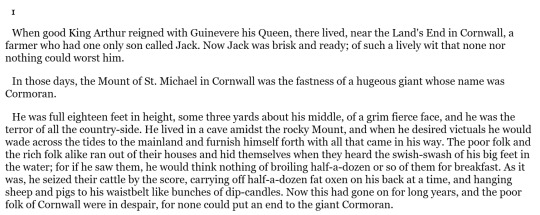
For the first three sections of the story, Jack goes around killing giants and making a name for himself (including a famous moment where he tricks a giant into commiting suicide).
For this post, we're skipping over to the part where King Arthur's son is introduced:

Lol. When I was reading this part, I couldn't help but imagine this Prince is actually Sir Loholt, who is sometimes Arthur's Legit son with Guinevere. It actually makes a lot of sense with Lanzelet's description of him:
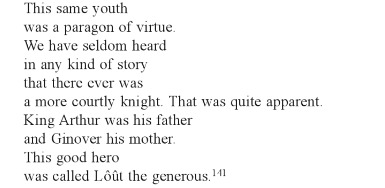
So yeah, for me he's Prince Loholt. :) Continuing on:

Yup. He's an Arthurian male character, alright. Too nice, not enough braincells.
Also, its kind of heartwarming to know Arthur and Guinevere would have a son who's so kind and generous, he wouldn't think twice to give up his riches if it meant helping someone.
So next up, Jack suggests that they sleep over at a giant's place. This is the other interesting about Jack the Giant Killer: He personally knows this giant and depending on the version, he claims this giant is actually his uncle. Other stories claim the giant is an idiot and Jack's just smooth talking him, but I think its way more interesting if the Giant IS Jack's relative. In Early Arthurian Lore, a number of giant-slayers, including Arthur, Kay and Gawain, all have giantish attributes (Kay's famous superpowers), have giants for relatives (Guinevere, in Welsh myth, is the daughter of Gogfran the giant) or are giants themselves.
Prince: Oh, so that means you're a giant, too? Jack: I guess? Prince: Cool. My Mother, the Queen, is a giantess as well. We're kinsmen! Jack: ... Prince: Also, my uncle can grow really big.
So Jack goes up to the giant's castle and knocks on the door:
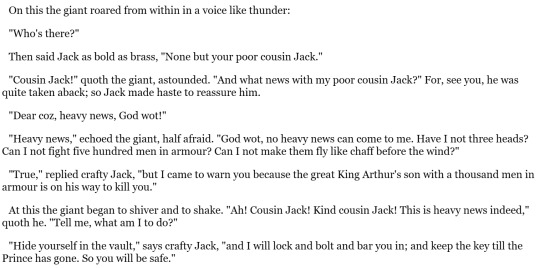
So Jack and the Prince spend the night in the giant's castle while the giant himself is locked away. The next day, the Prince continues his journey while Jack promises to catch up after he deals with the giant. What's interesting here is that this giant isn't slain like the others. He survives, unlike Jack's other foes - which kinda puts more points to my theory that this really is Jack's uncle and Jack is a half-breed giant of sorts.
The giant wants to reward Jack:

These magic items are your classic fairy tale archetypal tools that have their inspiration found in earlier myths: You have your bog-standard cuts-through-anything magic sword (like Excalibur), the slippers are the "Seven-League boots" (Based on Hermes' winged sandals) and you have an item that confers invisibility (It comes in many forms: Hade's helm, Siegfried's cloak and even Arthur himself has an Invisibility cloak too)
Jack getting these items is a way to give your hero superpowers without utilizing... unsavory methods. That he's able to use these items despite belonging to - and presumably used by - a giant is never questioned.
Moving on, we get to meet the "Possessed Lady" Loholt the Prince was after this whole time:

Well that was rude. So naturally, the Prince despairs until Jack does something about it:

Methinks that this lady is actually a murderous sorceress and isn't actually possessed.

This is romcom material.
Lady: Um, what is wrong with him? Jack: *Puts on his Cap* ...Camelot, apparently...
So once again, its up to Jack to save the day.

Are you sure this Lady is possessed? Also, she's scolding Satan - definitely wife material Queen material.

And so, Satan was killed (lol), the Lady was restored to her former good looks (even though she was already described as beautiful), she and the Prince get married and Jack gets to be one of the Knights of the Round Table.
And that's the end of this section of Jack the Giant Killer's story and end of this post. Jack's story goes on for a few more episodes of giant-slaying before ending on your typical "...and they lived happily ever. The End."
I wonder what the usual cast's (Arthur, Guinevere, Merlin, Lancelot, Gawain, etc.) reaction to this story would be.
It's notable that (at least in the version I'm reading) this section with "King Arthur's Son " is longer than other stories. Moreover, no giants are actually killed in it. The "uncle" giant was merely hood-winked and Jack uncharacteristically spares him. The story is mostly about helping King Arthur's son woo a demonically possessed Lady.
#jack the giant killer#fairy tales#sir loholt#king arthur#queen guinevere#arthuriana#arthurian legend#arthurian mythology#arthurian legends
24 notes
·
View notes
Text
Character Catalog
Sir Aaron
Aaron Gawain Fox, an unforgettable name, is the renowned archer and infamous bravery of the Nexo Knights. He takes the title of the Emerald Knight and wears the crest of a fox on both his chest and crossbow.
Family and History
Danger and thrill were engrained in Aaron’s brain the moment he was born, but he wasn’t the only one. As the seventh child to what would eventually become fifteen, it was a family tradition to introduce each new addition to a chaotic, unforgiving world. Not that it bothered any of them. The town of Grindstead was already riddled with urban legends and superstitions, so they would all learn to adapt to the lingering disorder, perhaps even join in the madness. Fear had been an emotion conquered quickly by the Fox siblings, but it came easiest to Aaron. He felt no fear. Literally. He physically couldn’t feel any fear.
Their parents’ disapproval of their reckless behavior was a common occurrence. They had hoped one of their kids would marry rich, become successful, or strive to end the nonsense of the town. Instead, each one grew up to contribute to the chaos and become the talk of the town for the week, slandering their family name with every new story told. Life in the village by the sea was already tough. Their father, Lot Fox, was a merchant. Their mother, Morgan Fox, a tired fisherman and huntress. Both struggled to keep food on the table to feed everyone in the house and relied on the older children for aid, but they seemed to make matters worse at times. The parents still fight to keep the secret that Aaron is a changeling, possibly replaced at birth. Not even he knows.
The only other person who knew was the eldest of the fifteen, Vander Fox. Vander had been a third parent to the children for a majority of his life, paying for food and helping out when neither parent was present due to work, burnout, or another pregnancy. But instead of conditioning them to order and fear of the outside world, he taught each of them how to open their hearts to chaos and be brave.
All the Fox siblings grew up despising the knights and the system, and Aaron made it his sword duty to run them out of Grindstead. They believed all the knights were good at were wearing rich armor and abusing their title to strip the town of necessary resources, a fact they knew to be true after many investigations. With every stunt, prank, and scheme, the siblings hoped to scare or infuriate the deployed knights of their town enough to convince them to leave for good. Aaron, Vander, and two other brothers named Tommy and Thomas led the charge. Their stunts were so impressive, the whole town had their undivided attention.
On one horrific day, a prank went terribly wrong when a wild giant feline stormed into Grindstead and hunted the Fox brothers. Vander desperately fought the monster to protect his family and lost his arm in the process, but instead of treating the wound or escorting them to safety, the current knight scolded Vander for carelessness and endangering the lives of his family. Angered, Aaron lashed out at the knight by brutally wounding him with his own weapon.
Word reached Morgan and Lot. After a horrid argument between them and their disgraceful children, Lot decided to send Aaron to the Knight’s Academy as punishment. Perhaps becoming a protector of the realm would not only restore honor to their family name, it would also teach the children a valuable lesson in discipline, Aaron especially. With only a night to reminisce on the good days and say goodbye, he was sent off to Knightonia for four long years of knight training.
Personality
When people talk about Aaron, the first word that comes to mind is usually “brave”. He has been known for showing no fear regardless of the dangers presented, a flaw born of his fey blood. In truth, he physically can not feel fear, but he doesn’t know that, nor does he know about the horror of his birth.
His gluttony for the next extreme record to break has made many people call him reckless and self destructive, and he wouldn’t deny it if confronted. But he is quick to refer to himself as a chill, go-with-the-flow type man who always needs something to do. Whether it’s racing in the canyons or replaying a video game, he will never sit in the same place for more than five minutes.
Despite his collected, chaos thriving personality, Aaron has an ineffable distaste for the knights and a lingering guilt for his brother’s downfall. Perhaps he chooses to be calm for his own sanity, or perhaps he’s grown to accept his punishment.
Trivia
• Aaron Fox’s name is two puns in one. The name Aaron is (supposedly) similar to the word “arrow”, for his main weapon is a crossbow. Additionally, his full name is a reference to Back to the Future. The actor for Marty McFly was named Michael J. Fox.
• Aaron’s middle name is Gawain. Vander’s is Agravain, Tommy’s is Gareth, and Thomas’s is Gaheris.
• His body shape is very slender and tall. He stands at 6’3” and weighs only 145 lbs.
• He’s double jointed and can easily perform contortionist acts if he wanted. But usually he utilizes his flexibility for parkour.
• His eyes are deemed “colorless” due to their desaturated silver color. When a bright light is shined in them, they reflect the light off them like the eyes of a deer.
• At the age of 13, he got ran over by a cart and fractured his hands and ribs. Only his right pinky was beyond repair and had to be amputated.
• Aaron’s armor is the only set that consists of lighter steel alloys and sturdy leather. The fox ear piece on his headphones are hearing modules that increase his hearing immensely, and his visor is the only one with a glass cover over the eyes to prevent wind burn and give him access to a radar and aim-locking system. Additionally, his hands come with retractable “claws” to help with climbing, high speed chases, or melee combat.
• He is ambidextrous but often forgets that and will pick a hand when asked which one he uses more often.
• He is bisexual and is referred as he/they.
• He will randomly make fox noises in replacement of worded reactions to things. The knights don’t know why, but in truth, he and his siblings used those noises as a way to communicate with each other without using words during their younger pranking days.
• Shockingly, he doesn’t like foods that are too sweet. The other knights are in disbelief that he drinks black coffee in the mornings. But he does like dark chocolate.
• Indie rock enjoyer, but he listens to just about everything and has a playlist for every music genre.
• Skilled in a crossbow but can wield other weapons. He keeps a dagger given to him by Vander on his person at all times, and he’s able to dual wield short swords and sickles.
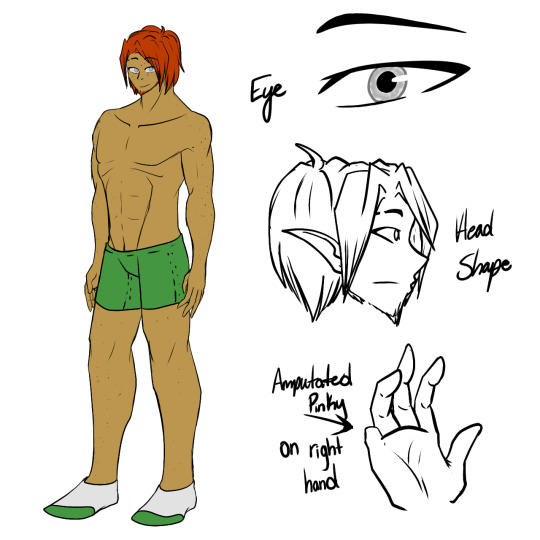
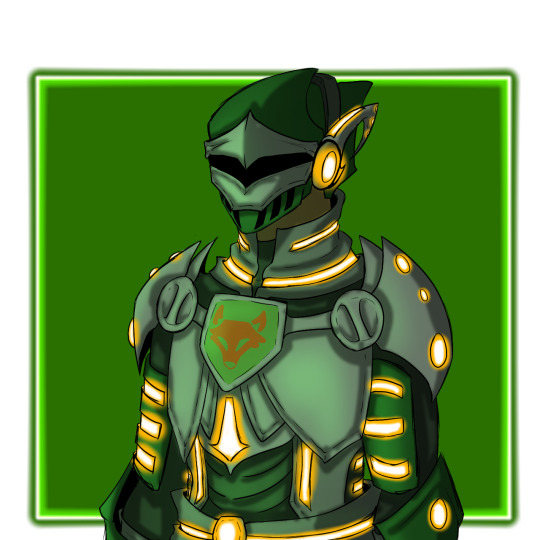
28 notes
·
View notes
Text
The Morrigán
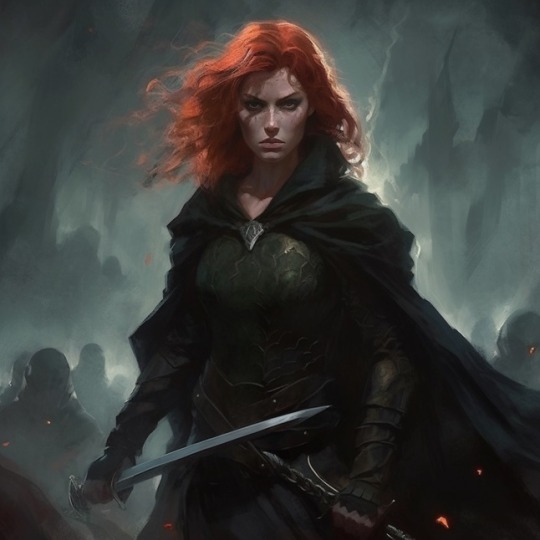
Name: The Morrigan (Great Queen, Phantom Queen,) Mor Rioghain, Morgain, Mórrígu, mór rígain, Morgan La Fay, The Bean-Nighe or The Washer At The Ford, The Wife of the Green Man, the Wyrd Sisters.
Symbols: Raven or Crow, spear.
Goddess of: Battle, prophecy, fertility, and sovereignty
Usual Image: A shapeshifter, she appears in many forms, a beautiful maiden, a mature woman, an ancient hag, a crow, a bear, and others.
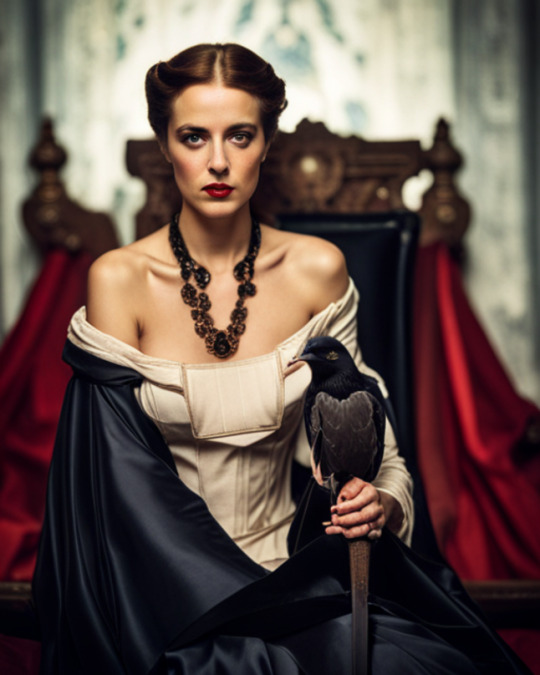
Relatives: Ernmas (mother) Cailitin, a Druid or Delbaeth or Dagda (father) Anu, Badb, Macha or Badb the Crow, Nemain the Venomous, Fea the Hateful. (Sisters or other aspects of her or goddesses she presided over.) Eriu, Fotla, and Banba (other sisters and goddesses of the land, not other aspects of her) Mechi (Son, father unknown) had three hearts, which were three serpents. The serpents, it was foretold, would destroy Ireland, so MacCecht killed him and burnt the hearts, throwing the ash into the river Berba; even then, the ash of his hearts boiled the waters of the river away and killed all the fish in the river.
Holy Books: Book of Leinster, Book of Fermoy
Synodeities: Kali (Hinduism,) Cathbodva (Gaul.)
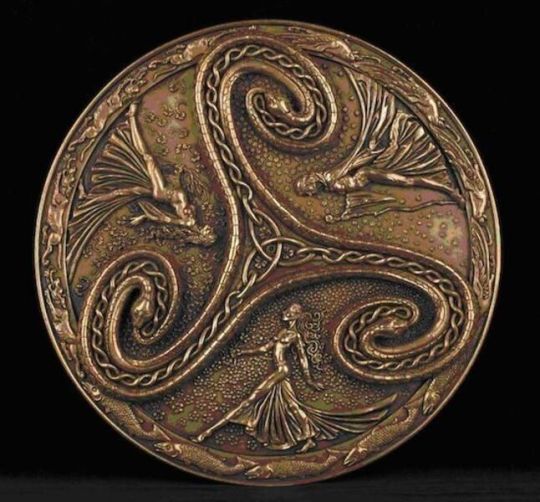
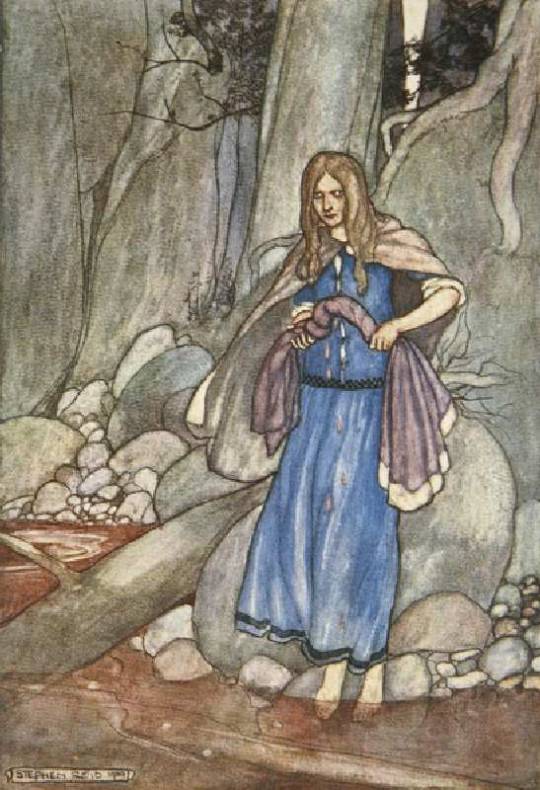
(The Watcher of the Ford, illustration from Cuchulain, The Hound of Ulster, by Eleanor Hull 1904)
Details: Once you look into the myths about the Irish goddess Morrigan you begin to understand why the Celts developed the Celtic knot!
At her most basic, Morrigan was a goddess of battle, who did not take part in the battle itself, but instead stirred up strife, then flew over the battle in the form of a crow who picked who would die by casting confusion on them, afterward feasting on their remains.
Not your warm and affectionate sort of goddess, yet she was also a goddess of fertility and sovereignty, without whom the king would be powerless.
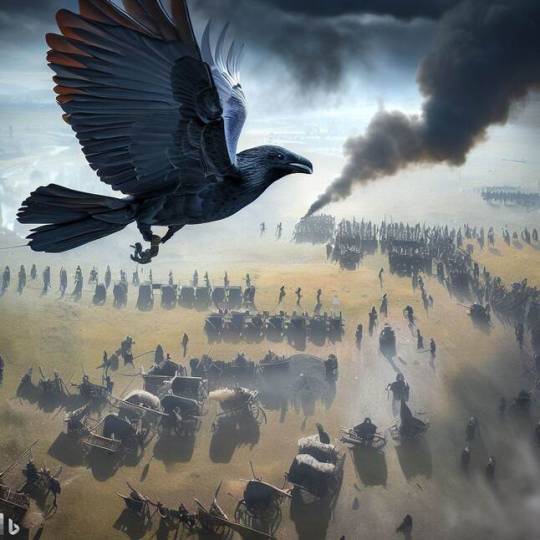
Going deeper into Morrigan (or The Morrigan as this may have at some time been a title) we find that she is also a triple goddess, who, along with either her sisters Badb and Macha or, in some accounts, Nemain the Venomous and Fea the Hateful, play a shifting role in scores of myths and legends.
What brings this goddess back in so many forms and guises, and age after age, returns in another form, even if this means mixing aspects that are both grand and horrific?
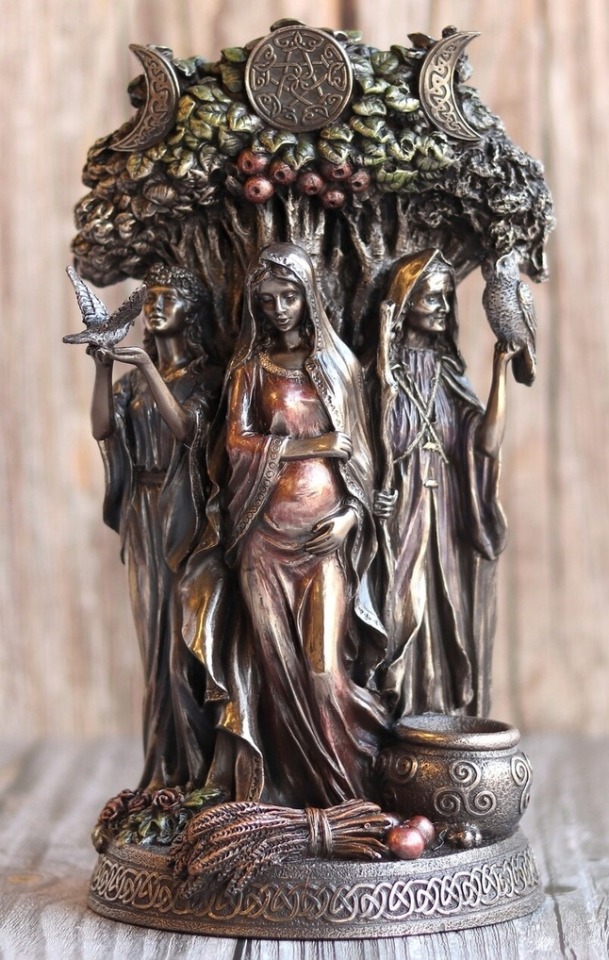
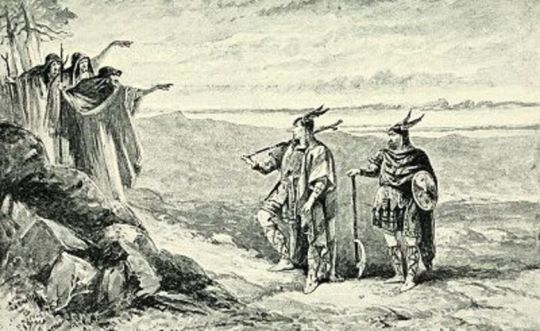
An answer might be found in the theory put forth by Ralph Abraham, mathematician, historian & Chaos theorist, in the book Chaos, Gaia, & Eros (1994, Harper Collins.)
To oversimplify it for this page, his theory is that three main forces have driven human consciousness through the ages, which he calls.
Gaia: The physical existence and living spirit of the created world.
Eros: The spiritual medium connecting Chaos & Gaia, the creative impulse and
Chaos: The creative void, the source of all forms.
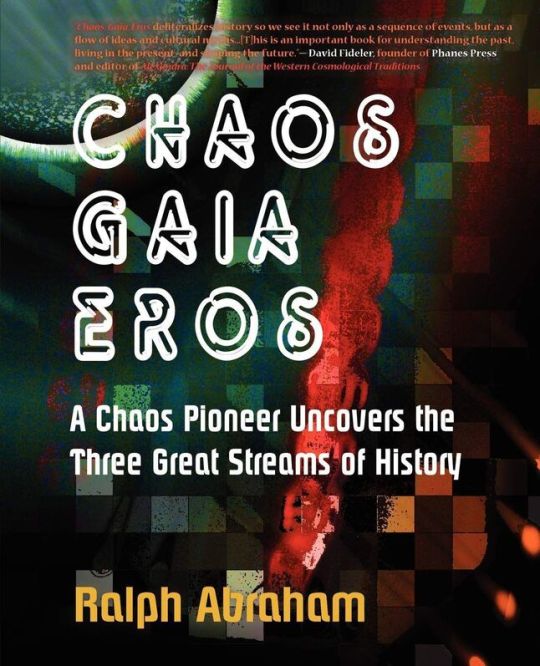
From the Paleolithic to the present, these three forces moved us forward, with at times one or more of them being suppressed only to resurface again and again.
Whoever the original goddess was who returned as the Morrigan, she was most likely first worshipped in a very different form sometime between 10,000 & 4,000 B.C.E. During what he called the Gaia span (agriculture/partnership.)
With the coming of the Eros span, 4,000 B.C.E. to +/- 1962 A.D. (the wheel, patriarchy & science), she was re-imagined by a new way of thinking that often feared Chaos and almost always had, as part of its dominant mythos, the conquest of Chaos by a hero or god representing Order.
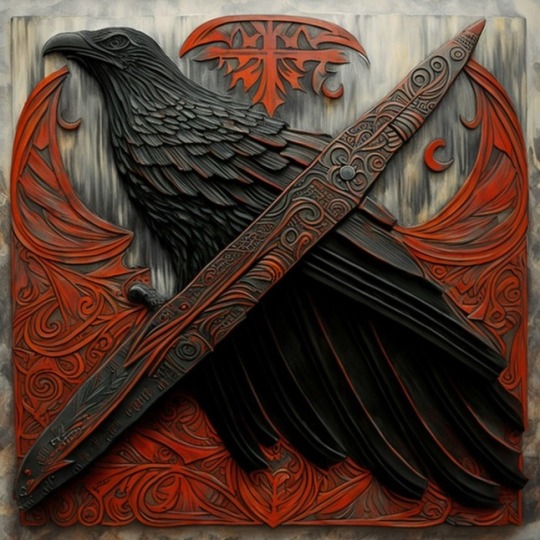
In this way, Morrigan changed from life-giver to carrion eater, and yet the three forces she is a part of continue to bring her back in multi-triad forms.
So that as the Eros span grew, she was not undone or put away but continued to shapeshift.
Changing from setting as a raven on the shoulder of dead Cú Chulainn to reappearing as Morgain La Fey in the tales of King Author, or as the wife of the Green Man and tempting Sir Gawain, to stirring the cauldron for Macbeth as the Wyrd sisters, and later as part of the Celtic Fairy faith, becoming the Bean-Nighe who is seen washing the bloody clothing of those who are about to die.
The thing is, in this theory, the Eros span has now begun to be overtaken by the now-developing Chaos span (Neo-Pagan, Post Modern, Chaos Theory, and meta-modern), which offers the hope of the end of the suppression of these three forces so they can be understood with positive effect.
No doubt the form that Morrigan takes in this era, if his theory is correct, will be most interesting indeed!

43 notes
·
View notes
Note
i’m new to arthuriana but love your posts nonetheless
i am just curious about the many references to gawain sleeping with so many people when, to my understanding, in sir gawain and the green knight he specifically breaks this promiscuous behaviour and makes sure he doesn’t sleep with the wife of the duke
(i apologize if this is a stupid question!)
hello anon!
welcome to arthuriana and thank you so much for the kind words. this is not a stupid question at all! the truth is gawain is nothing if not inconsistent between texts haha. he's different from other knights such as lancelot who pines solely for guinevere across text after text, in that it seems every author wanted to create their own special gal for gawain. he therefore has numerous women attached to him, and when readers try to reconcile those many texts into a single story thread, it gives the impression our mans gawain gets around! (and he does!) i have several examples here to illustrate this so i'll put it below a cut.
for all the textual variance, sir gawain and the green knight is the exception that proves the rule—meaning that it's perhaps the only text in which gawain is abstinent. we know this because one of the five virtues attributed to the five points of his pentacle crest on his shield is chastity.

furthermore, on the wife's second seduction attempt, gawain pleas his own inexperience with "love" (ie: women).

whether or not that's true is up for debate, but it's worth mentioning, as it's a departure from other texts where his virile prowess is well-known, and in the knight of the two swords, he openly boasts about his own attractiveness and popularity. (humble guy, that gawain!)
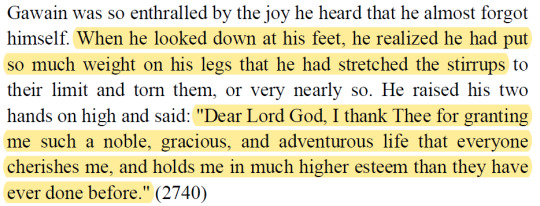
there are several examples of gawain's reputation with the ladies preceding him and actually benefitting his odds of getting laid. one of my favorites is from lancelot part II in the vulgate. gawain had just cured his brother agravaine of an illness and agravaine's amie basically wingwoman's her sister.
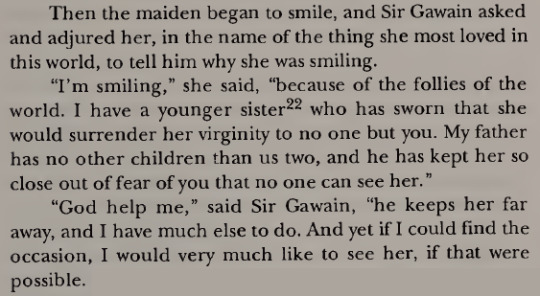
goated of her. so gawain pencils it in on his calendar. later, he locates the castle, sneaks in, and succeeds in bedding the maiden. she's not named here, although malory later refers to her as "the lady of lys," and accredits her as the mother of gawain's three sons, (although the couple never formally wed).

among the strangest of examples is the middle english text the carle of carlisle, in which the carle brings gawain to the bedchamber and orders him to make out with his wife. but things quickly heat up...
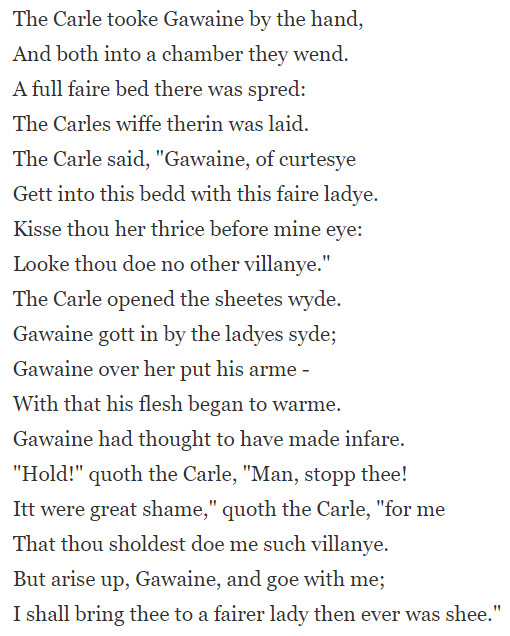
so the carle stops gawain from outright cuckholding him, then leads gawain to his daughter's chambers, gives them his blessing, and locks them inside. at the end of the text, gawain marries her.
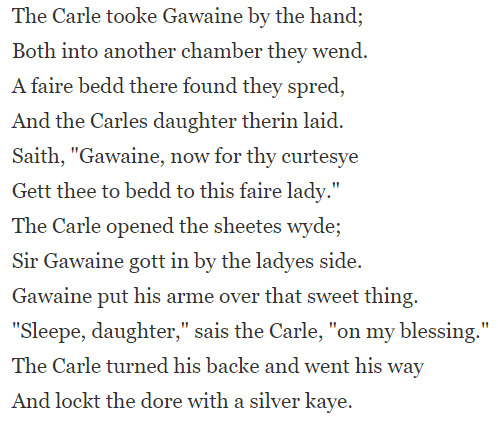
now i would be remiss not to mention my beloved the wedding of sir gawain and dame ragnelle. i think it's notable that ragnelle specifically asks for gawain by name, much like the lady of lys did (according to her sister and her warm reception of him).
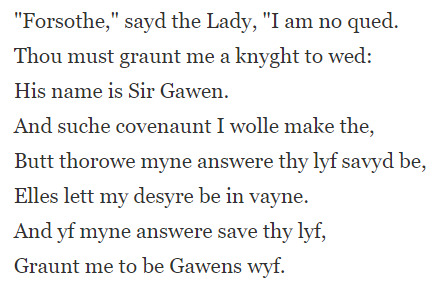
now the conclusion of this poem brings us to another theme of gawain's which ties into his many partners, and that is his consistent subservience to ladies. he breaks the curse on ragnelle by granting her "sovereignty" in the relationship. this seems to be another aspect of character which sets gawain apart from other knights, as this is not a chaste expression of courtly love, but a precursor to fornication, and draws the attention of strong-willed ladies, such as ragnelle, with whom he is "a coward," or according to the translation notes, "submissive."

then again in roman van walewein, he's already famous by the time he meets his ladylove, ysabele, and whilst tied up in her father's prison, he leaves the decision of his own life in her hands.

which then results in their coming together because this is a gawain story and he always gets the girl.
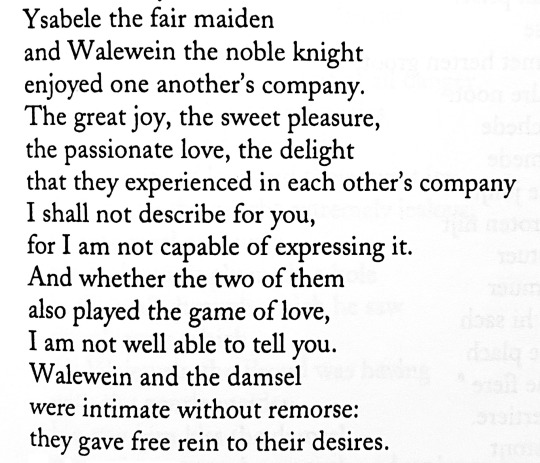
even in the post vulgate, which we can all agree portrays every single character at their absolute worst (and is therefore invalid<3), gawain's choice of words consistently upholds the lady's desires above his own. at first, gawain intended wingman for pelleas by pretending he, pelleas, was dead to begrieve arcade. he discovers instead that she's elated by pelleas's supposed passing, so she and gawain fall in love. but even after admitting his feelings, he still takes great pains to frame the final crossing of that line as her choice, and only relents when she makes her intentions plain.
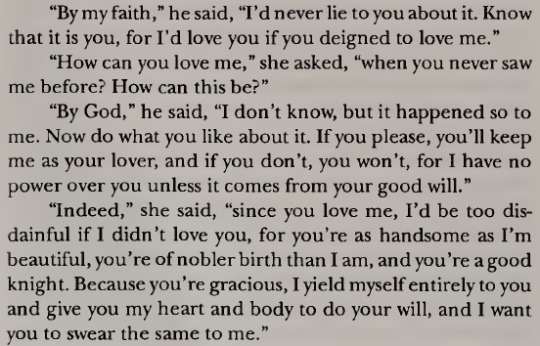
he might also just like it when women boss him around if his treatment from orgeluse in parzival by wolfram von eschenbach is any indication.
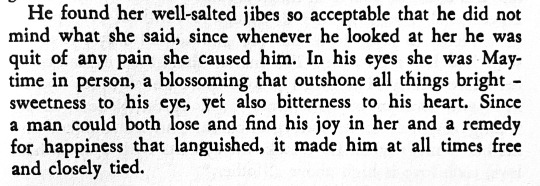
similarly to the knight of two swords, in parzival, gawain is aware of his fame, fosters it, and then employs his orgeluse brain worms as a motivation for sparing lives instead of like...morality.
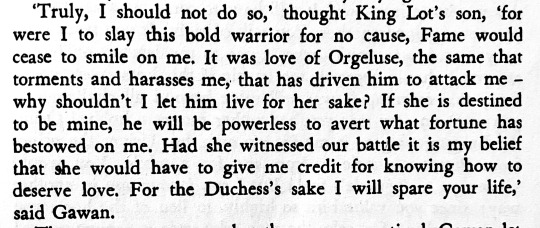
i think what's particularly interesting about gawain's relationship history is that many of his partners are named, whereas it's pretty common for damsels and maidens in medieval texts to exist without identities of their own. there are so, so many named, interesting, fully developed women linked to gawain, it's actually pretty awesome! here are a few more:
lunette in yvain: knight of the lion by chrétien de troyes...

amurfina in the crown by heinrich von dem türlin...

bloiesine in the 4th perceval continuation by gerbert de montreuil...

marjorie in gawain and marjorie by oscar fay adams (if we extend our search through the 20th century!)...

and on and on forever! so in conclusion, gawain has been pulling bitches for many hundreds of slutty, slutty years, and from what modern retellings i've read, authors have no intention of interrupting this trend. i hope that helps clear things up somewhat. thanks for the ask!
#arthurian legend#arthurian legends#arthuriana#sir gawain#gawain#sir gawain and the green knight#sgatgk#the vulgate cycle#the prose lancelot#the lancelot graal cycle#the carle of carlisle#the wedding of the sir gawain and dame ragnelle#roman van walewein#parzival#knight of the lion#the crown#perceval continuations#4th perceval continuation#gawain and marjorie#oscar fay adams#quotes#resource#ask#favorite ask to date thank you<3333#my post
185 notes
·
View notes
Text
GAYEST ARTHURIAN TEXT BRACKET ROUND 2:
propaganda:
Bisclavret:
- “Honestly if you don't know Bisclavret I don't know what you're doing here; it was literally taught on my university course as an example of potentail overlap between medieval studies and queer theory, it is spectacularly resonant in its themes of identity, personhood, situation of self in class and romantic-dynastic-sexual systems. The devotion of the knight to his king expressed without any of the trappings of knighthood or even a human voice. It is about yearning, it is about love, it is about love-as-loyalty, it is the literal 'let me be your hound', it is the werewolf as the outsider as the lover. When the knight awakes in the king's bed, returned to himself through love, he is greeted with rapturous joy and kisses and embraces. I really don't know what else I can say.”
- “the king…. the werewolf… I thought they were…. no, it couldn’t be….”
- “gay werewolves. need i say more???”
- “he gave him over 100 kisses <3”
- as someone who literally did my ma dissertation on werewolves i can confirm they have historically been inherently queercoded
Prose Lancelot:
- “this is the one where Galehaut gives up fighting Arthur because Lancelot bats his eyelashes at him. He spends a solid chunk of time living in chaste polyamory with Guinevere AND Lancelot. later they get separated and Galehaut dies for love because he thinks Lancelot is dead. Lancelot buries him with his own hands and tries to die by his side.This is Also the one where Gauvain says he wishes he was a woman just so he could bang Lancelot and Guinevere goes "same".”
- “GALEHAUT. Galehaut “had given [Lancelot] his heart with a love greater than loyal companionship alone could make a man feel for someone outside his family”, surrendered to Arthur for Lancelot, stepped over his own broken heart to help him be together with Guinevere, and then died of grief when he thought Lancelot had perished. Also, the remarkable bond of Lancelot and Gawain + Gawain saying he’d turn into a beautiful lady for Lancelot.”
- “Giving up on conquering the enrite kingdom because you want to be besties with Lancelot is pretty gay ngl”
- “Then Sir Gawain thought a little, like a man who believe he would never be well again. “If God were to grant me my health,” he said, “I'd immediately wish to be the most beautiful maiden in the world, happy and healthy, on condition that he would love me above all others, all his life and mine.” (Lancelot-Grail The Old French Arthurian Vulgate and Post-Vulgate in Translation, volume III, General Editor Norris J. Lacy, p.270)”
- “Going for sheer volume & variety here. Galehaut alone is worth the vote but Gawain's "I wish I was a woman so Lancelot would love me" line is just unparalleled. There's also a character named Drian the Gay rescued from a cursed coffin & as we all know, goths are queer on every axis. I rest my case.”
- “many reasons (galehauts whole thing…) but in particular remarkable reasons. that thing gawain says about wishing he was turned into a maiden on the condition that lancelot loves him for his whole life is a lot to me in particular in a multitude of queer ways”
17 notes
·
View notes
Text
Plotting out "Verdant" (Disney movie)

Make sure to check out my original post here.



Background: With the recent success that Disney's had in the "Reinvention Era" (named by the fandom as a way of explaining Disney's ability to regain critical and financial success due to finding classic and original ways to make their films in the form in storytelling), the studio is a lot more open to projects pitched to them. One of them is a story inspired by "Sir Gawain and the Green Knight" (said to have been spurred on the the pitcher having seen David Lowery's 2021 adaptation of the film). Disney is intrigued by the idea, but is intimidated by the concept of adapting an Arthurian story when their "Sword in the Stone" film being an iconic film in it's own right, so it's quickly decided that the project will not take place in the same continuity as the silver age, instead simply wanting to take the bare bones from the story (as they've done with many tales before). In particular, they wanted to keep the character of the green knight and a protagonist whose morality, sense of honesty, and integrity is tested. Wanting a different angle from the film to prevent it from being generic, Disney reaches out to Tomm Moore to direct the film. After some back and forth, he eventually agrees under the condition of it being 2D (using stained glass as inspiration), and Disney reluctantly concedes to this only since they've been dabbling in 2D again and meeting success. Needless to say, the film takes on an Irish flavor as a result of his involvement. They hire Phil Johnston to write the script, and in contrast to the more polite and noble male leads of the past few films, he decides to make the protagonist more of an antihero--not with the comedic aspect of Flynn Rider or light-heartedness of Aladdin, but more serious and traumatized. To elevate the material, they decide (after some deliberation) to make the film a musical, and the Anderson-Lopez team are brought on to tackle the music.
Plot

In the land of Tíroighir, Ciarán grew up in the times of destruction. His family was slaughtered, and all he knew was rage. He turned this on the first person he encountered, but was unable to defeat him--even after beheading him. The mysterious man offers to take Ciarán under his wing and train him in order to get revenge on those who took everything from him. Ciarán accepts, and when he gets older, he feels the time is upon him to exact his revenge.
Characters
(Note: As usual, these do not represent the imagined characters in their capacity, but a brief overview of a few pivotal characters that push the narrative forward.)
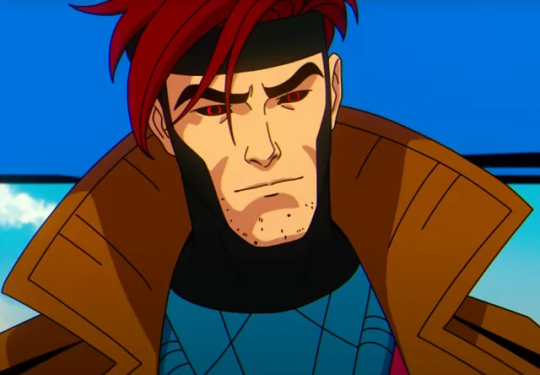

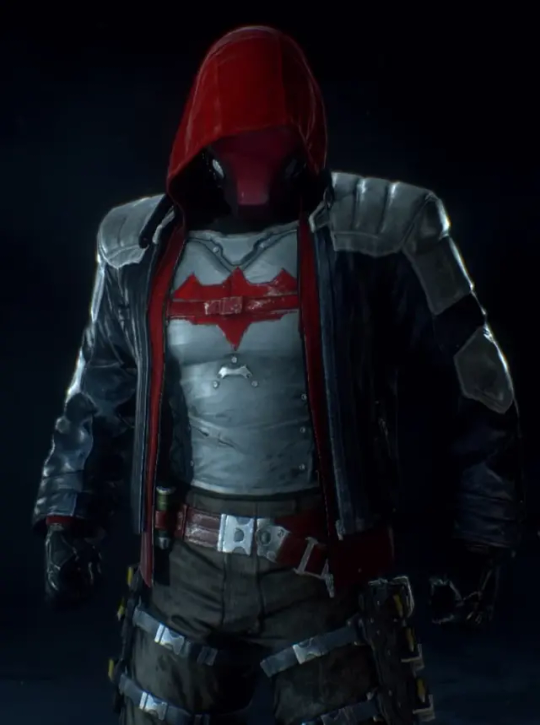
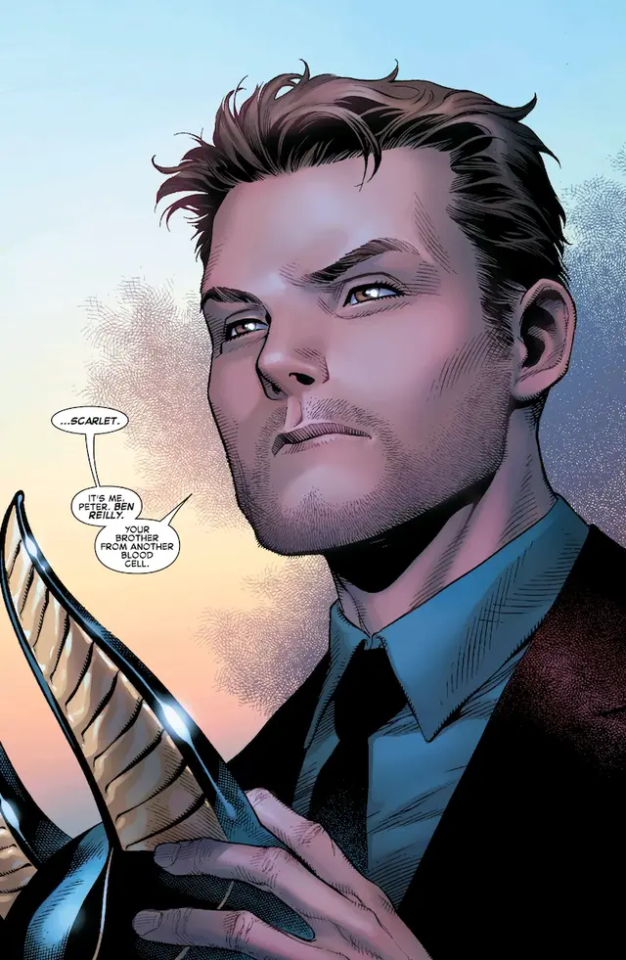
Ciarán--A young man home was devastated by followers of a demon. He only escaped because of his magical abilities; unbeknownst to him, he was a changeling (the only visual sign of this being his dark blue hair that to the untrained eye looks black). He was raised in the Emerald castle, but often travels trying to find the cult members who can lead him to the demon that took everything from him, and he'll kill them all. While he comes off as casual and confident, he's slightly unstable, emotionally-speaking (and perhaps mentally, but who can blame him?) His fight against the cult is somewhat self-destructive, with the implication that a part of him doesn't care what happens if he loses the fight.


Síomha--A warrior leading the charge against the cultists, she represents the human side to Ciarán's supernatural nature. She finds Ciarán to be a useful ally. Of course, she recognizes his dangerous nature, and they frequently come into conflict.
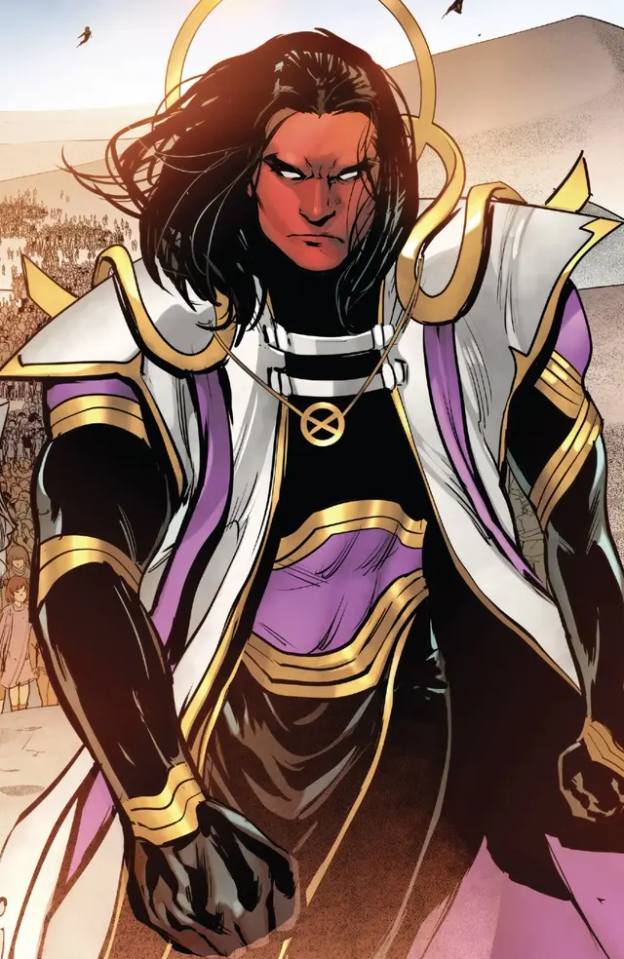

Neirin--The name the demon was given by his worshipers. He is known as the magic devourer, and his very existence causes decay and fear in all around him. Now that he's in the mortal plane, he exists only to drag the land into disorder, draining the life and magic from the land.
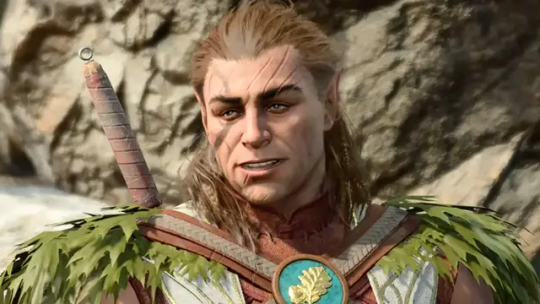

Flaithrí--Colloquially known as the harbinger of spring or the "Spring King" because everywhere he walks, flowers seem to grow (plus he's green, so there's that). No one is entirely certain where he came from. He mentioned to Ciarán that he and his sister came from a long-forgotten world, unable to speak the native language for many years. His magic is beyond anything that Ciarán can imagine, and he is seemingly immortal. While he promised to train Ciarán in the art of magic to get his revenge, he can see that in his heart, he is much more honest and gentle than he lets on. He just hopes that when it comes down to it, Ciarán won't lose himself in his trauma.
Songs
Can't Say No--When his family is murdered by the cultists, Ciarán wanders the land. He comes across Flaithrí, and in a rage, decapitates him. However, Flaithrí survives and puts a faint scar on the back of his head in response. He sees the pain in Ciarán's eyes and offers to take in the new orphan, to which Ciarán meekly accepts.
I've Never Felt It--Seeing how his desire for revenge has started to harm others, Flaithrí tries to firmly dissuade Ciarán against seeking revenge, which Ciarán is shocked and devastated to hear, explaining that he hasn't felt happy in a long time until he felt like he was making progress on his quest.
Like an Animal--Síomha gives a speech to her warriors that they must hunt down and defeat the cultists before they can summon the demon, concerned that they may already be too late.
Unsung--Ciarán has nightmares about the terrors Neirin will unleash, as well as reliving the destruction of his home. When he left Flaithrí, Ciarán was told that he might be a changeling, and he starts to dream of the realm of the fairies.
I've Never Felt It (Reprise)--Ciarán speaks with Síomha about not being able to find Flaithrí after leaving him, no longer remembering the way to the Emerald Castle. He wonders if it's his destiny to be abandoned, and Síomha wonders if there's any true way to stop Neirin.
The Demon Inside--The cult members sing about summoning Neirin, about the destruction and carnage he will bring, with the added benefit that lyrically the song also parallels Ciaran's inner turmoil.
Dreams--Ciarán has managed to defeat Neirin, and with the magic stolen by the cultists restored, he plans on finding his fairy family.
Hope you enjoyed it! As with the other specific cultures I covered in my other fanmade Disney movie posts, I don't know much about Celtic cultures, and hope Disney would do MUCH more research than me (though having and Irish director helps)! Next up is my superhero fanmade Disney musical. Still working out a title.
#disney#disney animation#the green knight#king arthur#gambit#xmen#x men#marvel#marvel comics#sasuke uchiha#naruto#jason todd#red hood#dc comics#ben reilly#spiderman#hercules#megara#exodus#muzan kibutsuji#demon slayer#kimetsu no yaiba#halsin#baldur's gate#baldur's gate 3
6 notes
·
View notes
Text
The parallels between Lelouch and Suzaku with Sir Gawain and Sir Lancelot
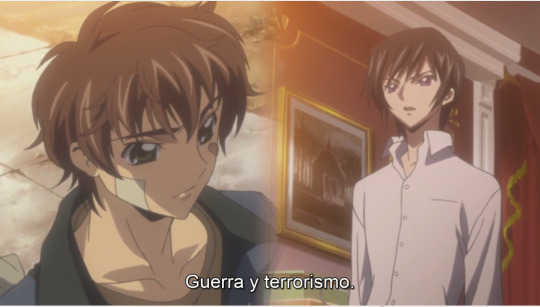
Did you know that the names of the Knightmares of the Knights of the Round and the first decent Knightmare of Lelouch are taken from Arthurian legends? Did you also know that Gawain and Lancelot were two knights from said legends who went from being friends to enemies in the same way as their namesake Knightmares pilots? And did you also know that Gawain and Lancelot have certain things in common with Lelouch and Suzaku?
Let me tell you!
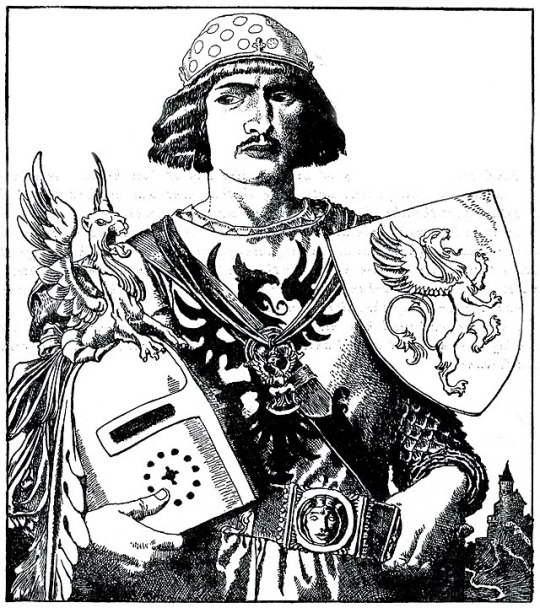
Both Lelouch and Gawain are older brothers, they are popular with women, they have a sinful and relentless nature (at least, that's how Gawain is in one of the many traditions), they are both on a path of revenge and were wronged by their best friends, Suzaku and Lancelot respectively (specifically, Gawain is referred to as Lancelot's most trusted friend).
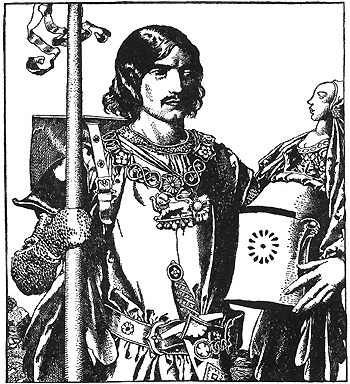
On the other hand, Suzaku and Lancelot are pacifists and virtuous. I will add that both of them, in a certain way, are traitors to their homeland, since Suzaku, being a Knight in the service of Britannia, joins Lelouch helping him to usurp the throne and giving him support and Lancelot is in love with Queen Guinevere, the wife King Arthur no more no less. Gawain and Lancelot are recognized as the greatest knights of the Round Table and likewise Lelouch and Suzaku excel in their respective fields (Lelouch is a genius and master tactician, while Suzaku is a star pilot).
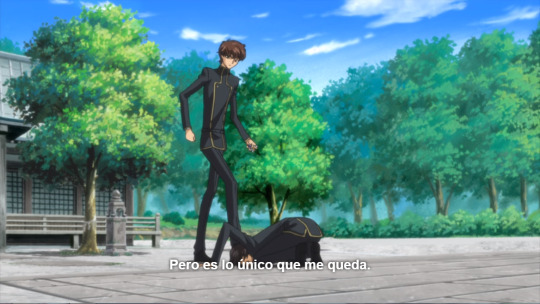
At what point does Gawain and Lancelot's friendship end and they become sworn enemies?
Well, when Lancelot kills Gawain's younger brothers, Gaharis and Gareth, while they are unarmed when they go to rescue (this was all a terrible accident; a word that isn’t foreign to the universe and fans of Code Geass). From then on, Gawain swore revenge on Lancelot and challenged him at every opportunity, though he refused to kill his dear friend.
Although Suzaku doesn’t kill Nunnally, Lelouch believed so and it wasn’t until he felt betrayed that he gave up his attempts to recruit him and finally decided to kill him. Of course, I'm referring to R2 episode 17 when Schneizel and his unit follow Suzaku to the Kururugi Temple; Lelouch thought that Suzaku betrayed him by handing him over to his brother and, therefore, in the following episode he gives Kallen the express order to destroy "the pilot of the Lancelot", so this betrayal is the product of a horrible misunderstanding (their enmity, on the other hand, was an irremediable thing since Lelouch turned Suzaku into his worst enemy and vice versa, but we will discuss that perhaps in another post).
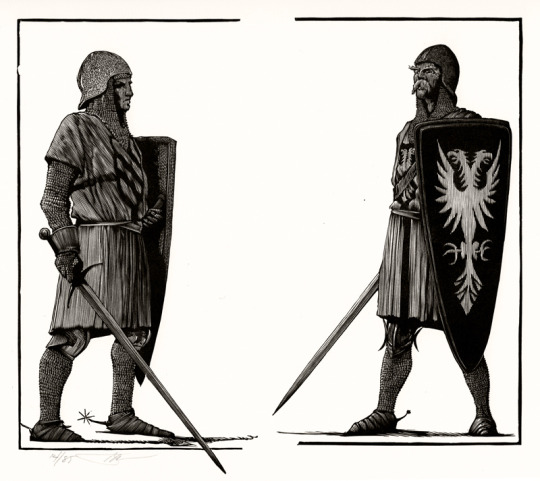
What happened to Gawain and Lancelot? In the end, Lancelot slew Gawain using a sword known as "The Red-Hilted Sword", which in appearance is similar to the sword Suzaku wielded to impale Lelouch in the Zero Requiem. Gawain spared Lancelot at his dying breath. In this sense, it is similar in what terms Suzaku and Lelouch's relationship was left since both managed to resolve their differences and the first ended up executing the second.
Keep in mind that there are as many legends of Gawain and Lancelot as there are superhero comics today. What do I want to tell you with that? That the characterizations of the characters, even the relationship between the two, vary depending on the cycle we are referring to. Gawain and Lancelot are characters that are part of the Arthurian lore and, in case you didn't know, chivalric literature was passed down orally. These characters don’t have an author (or not just one), but several minstrels who told these stories.
Hence, it seems to me that the comparison with superhero comics is the best way to illustrate them. The Batman from The Dark Knight Return is nothing like the Batman from Ego and is the same character. Just like the Gawain of Sir Gawain and the Green Knight is totally different from the Gawain that appears in "Le Morte d'Arthur", which, as I have reviewed on Wikipedia, is the work I was telling you about and it coincides with that dark stage of the character. I read Sir Gawain and the Green Knight some time ago and I seem to remember that Gawain was an example of courtesy and nobility and was firmly adherent to his vow of chastity and was thus represented for a long time, which is in stark contrast to Lancelot's lust that he was courting the king's wife (well, Suzaku did get to have an official relationship with Euphemia while Lelouch had multiple love interests, but never formalized a relationship, because he was committed to his rebellion and had no head for girls). Even so, I think I heard that the Green Knight movie, starring Dev Patel, and based on this story, Gawain has vicious attitudes and it would already correspond to that dark and bellicose version of the character (anyway, the director and the scriptwriter will have taken their creative licenses).
#lelouch#lelouch lamperouge#lelouch vi britannia#suzaku kururugi#suzaku#code geass#code geass: hangyaku no lelouch#code geass: lelouch of the rebellion#chivalric literature
50 notes
·
View notes
Text
Green Knight (Cavalier Archetype)

Ah yes, the Story of Sir Gawain and the Green Knight, one of the most well-known Arthurian legends, and yet, few people know that we very nearly lost this one, the original story only existing in one complete manuscript. Can you fathom how many other stories have been lost to time because of a lack of preservation efforts?
In any case, the story is so well-known that you can probably rattle off the plot relatively quickly. Sir Gawain, a knight of King Arthur’s court, encounters a mysterious green armored and skinned night who offers a game in which he will deliver the same blow to whoever strikes him in a year’s time. Foolishly Gawain goes for the neck, decapitating the Green Knight, only for him to get right back up, grab his head, and say “See you next year.” What follows is a tale detailing the inner struggle of young Gawain as he wrestles with his own mortal fear and his honor as a knight, as well as the temptations sent to lead him astray (by the Knight himself, of course. This is naturally all a trial of his devising). Finally, Gawain accepts his fate, but is greeted by surprising mercy as the Green Knight stopped his blade so as only to give Gawain a small cut on his neck.
Now, this story has been analyzed to hell and back from all sorts of angles, but today I’d like to talk about the Green Knight himself, more specifically, what is he? Certainly his allegorical nature is the topic of much discussion, but the knight himself might be an interpretation of a forest god alongside or even being a version of The Green Man, or he might even be a fey being.
The cavalier archetype that is named for this legend interprets the cavaliers in question as beings of mortal ancestry that have been blessed by fey powers, be they the Eldest, some lesser fey nobility, or even by the First World itself to have power over nature and even their own survivability, getting back up from even otherwise lethal maiming.
Regardless of their origins, these knights serve as noble guardians of nature, protecting the wilds while also upholding the honorable ideas normally seen in courts in civilization. Today we will be looking at those abilities and how they use them to great effect.
As guardians of nature, these knights have a special empathy for animal life, able to calm and befriend them the way that druids do.
They are also surprisingly tough, able to exert themselves and endure much pain without faltering.
They are, however, universally part of the Order of the Green, making them quite adept at defending nature, especially from the unnatural.
While others on death’s door would struggle to act, these warriors can not only ignore the pain and act at full capacity, but also avoid bleeding out when in such a state.
Like a druid, they also stride through natural terrain without hinderance.
Their toughness is so great that they can shrug off effects entirely that would normally at least have partial effect on their body or mind.
Green Knights even become immune to disease, infestation, and poisons, their bodies becoming impervious to such afflictions.
Among the most powerful of them find their weapons blessed to seek their target’s necks, ending most battles swiftly and surely.
The most powerful among them, however, become nearly unkillable, becoming warded against lethal necromancy and illusions, and even being able to live without their heads, fighting on even while decapitated, and able to reattach it with the help of common healing magic.
While you may give up your mount and class features associated with riding, this archetype proves tough and resilient, becoming almost paladin-like in the way they absorb incoming harmful effects and lethal damage, and boast order abilities geared towards slaying the unnatural. The utility abilities in dealing with nature are nice too. Buy yourself an ordinary non-class-feature mount and build for being a tanky and supportive combatant.
In the story, the Green Knight serves primarily to be the force that tests Gawain, the golden boy of Arthurian legend (at least until Lancelot and later Galahad supplant him in later stories), but the motives of your green knight may vary. Perhaps they have been selected by an order of druids to fight on their behalf due to their righteous and protective nature, or they may struggle to live up to the ideals that drew a fey to favor them in the first place, and so on.
Known throughout the land for her chivalry, Ser Vicen caught the eye of a fey queen, who offered her a deal, service in exchange for the forest’s protection for her kingdom. So far the deal has gone well, but recently Vicen has noticed changes, her skin taking on a greenish, plantlike pallor.
Every year, a green-armored knight has come during each festival year to test various nobles and knights in games of honor. However, the chancellor, secretly a kuwa oni, has had enough of this flagrant promotion of goodly virture in the nation that he has been trying to corrupt into debauchery for years. He seeks a no-questions-asked group to hunt down and slay the figure before he is the one picked for such a test, and found wanting.
Known now only by the name Mossmane, the centaur green knight that answers to that title is a local legend, a green-draped figure that wanders the forests in search of exploitation and evil to destroy. Those that prove their mettle might gain a bit of the elder warrior’s wisdom.
14 notes
·
View notes